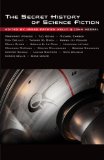The Secret History of Science Fiction, a new anthology aimed at questioning the existence of genre boundaries, could be a victim of the very issue it seeks to address. It uses the term “science fiction” in the title.
 The anthology proceeds from an interesting premise. Thomas Pynchon’s Gravity’s Rainbow was nominated for the 1973 Nebula Award for Best Novel, given by the Science Fiction and Fantasy Writers of America. It didn’t win. But then, the SFFWA treated Pynchon better than Pulitzer Prize officials. In 1974, the three-member fiction jury unanimously recommended the book receive the fiction award but the Pulitzer board vetoed the recommendation, calling the novel “unreadable,” “turgid,” “overwritten,” and, in parts, “obscene.”
The anthology proceeds from an interesting premise. Thomas Pynchon’s Gravity’s Rainbow was nominated for the 1973 Nebula Award for Best Novel, given by the Science Fiction and Fantasy Writers of America. It didn’t win. But then, the SFFWA treated Pynchon better than Pulitzer Prize officials. In 1974, the three-member fiction jury unanimously recommended the book receive the fiction award but the Pulitzer board vetoed the recommendation, calling the novel “unreadable,” “turgid,” “overwritten,” and, in parts, “obscene.”
Yet given that Gravity’s Rainbow is viewed as a classic of postmodern literature, James Patrick Kelly and John Kessel ask what impact it winning the Nebula Award might have had on science fiction. Specifically, would that have eliminated the distinction between literary fiction (‘li-fi”) and science fiction (“sci-fi”), a distinction many, myself included, have led to unequal treatment of the two? Would they have merged into a literary universe that had no regard for genre as opposed to creating new labels, such as slipstream, as an accommodation? In making the case that genre labels should be meaningless, The Secret History of Science Fiction also demonstrates how pervasive they are.
No one should be surprised that an author like Margaret Atwood appears in the collection. After all, she’s not only been successful with so-called mainstream fiction but with several novels she calls “speculative fiction.” But there’s also stories from Karen Joy Fowler, Jonathan Lethem, T.C. Boyle and Don DeLillo — yes, that Don DeLillo. In addition to each contributing a story, Kelly and Kessel compile previously published pieces by those most would consider science fiction writers, those most would consider as part of mainstream literature.
In fact, Lethem, who has achieved “li-fi” success, is in large part responsible for the collection. A 1998 essay he wrote gave rise to the premise used by Kelly and Kessel. Lethem appears in the anthology with the story, “The Hardened Criminals.” The title is a literal one, as it involves a society where the walls of the main prison are constructed by hardening the bodies of long-time criminals into blocks. That is how the main character, a first-time prison inmate, becomes a cellmate of his father, who has been part of the prison walls for years.
Lethem is just one example of so called “li-fi” writers using “sci-fi” as a vehicle. The science fiction of today is rarely the “gee whiz” approach that marked the genre in its early years. Instead, fantastical settings provide a stage for stories that explore characters, social commentary and, most important, ideas. Thus, DeLillo’s contribution, “Human Moments in World War III,” centers on the thoughts of two astronauts orbiting the earth as a third world war, albeit non-nuclear, is waged below. Fowler’s story, “Standing Room Only,” is built around the plot to assassinate Abraham Lincoln but with an unusual aspect. Boyle’s “Descent of Man” is perhaps the most off the wall, examining the relationship between a highly intelligent primate and one of the scientists studying it.
Abraham Lincoln also makes somewhat of a cameo appearance in “The Martian Agent, A Planetary Romance,” written by Michael Chabon. Chabon is perhaps the most recent example of highly successful writers who ignore genre distinctions. While his novel The Amazing Adventures of Kavalier & Clay won the 2001 Pulitzer Prize for fiction, his 2007 The Yiddish Policemen’s Union was also a bestseller that won not only the top awards for best science fiction novel but also for best mystery novel. Here, his story, which has no Martian characters, is a steampunk look at an America still ruled by Great Britain.
Of course, the fact these are most often considered “li-fi” authors doesn’t mean their science fiction-oriented stores stories are more sophisticated or insightful than those of authors more frequently categorized as genre writers. Kate Wilhelm’s “Ladies and Gentlemen, This is Your Crisis” is an engaging commentary on the intersection of life and reality television. In “Schwarzschild Radius,” Connie Willis uses the horrors of trench warfare in World War I as the setting for the development of the theory of black holes and the physics involved as a metaphor for human emotion.
The Secret History of Science Fiction makes fairly clear that while genre boundaries are becoming more blurred, literature may never become unitary. Most people who read the stories would believe they were science fiction and those tales in any gray . are stories for which terms like slipstream were created. All this may reveal the intractable nature of the problem. Even those who agree genre distinctions are unfair tend to fall into the trap genre creates. That’s especially so when the title of the book itself categories it as science fiction.
Would a Nebula Award for Gravity’s Rainbow have eliminated the li-fi/sci-fi distinction? Will Chabon’s The Yiddish Policemen’s Union take us closer? It’s doubtful. Yet The Secret History of Science Fiction makes clear that trying to slot literature into specific holes is a disservice to the author and the reader, even when we adhere to those categories unconsciously.
The bankruptcy of assertion that mainstream novels set in the future can’t be science fiction because they’re not written by science fiction writers arises out of a kind of tribalism that does not bear close scrutiny.
Introduction, The Secret History of Science Fiction








